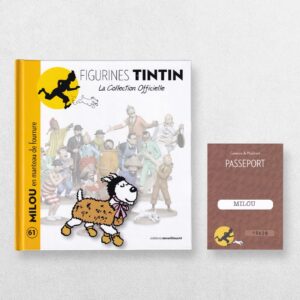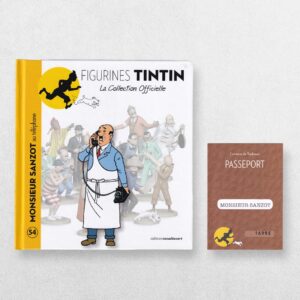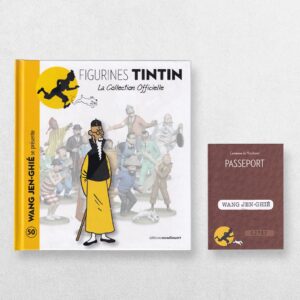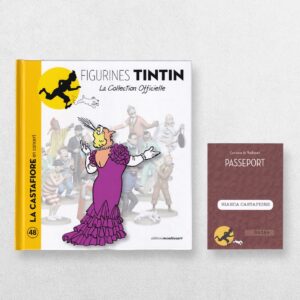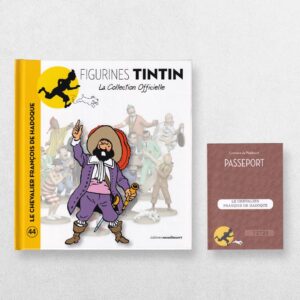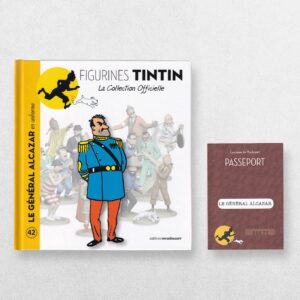Mohammed Ben Kalish Ezab The Emir Of Khemed – Figurines Tintin La Collection Officielle – 62 – Mohammed Ben Kalish Ezab L’Emir Du Khemed
Hergé & Editions Moulinsart
£60.00
Availability: In stock
Product Description
Mohammed Ben Kalish Ezab The Emir Of Khemed – Figurines Tintin La Collection Officielle – 62 – Mohammed Ben Kalish Ezab L’Emir Du Khemed
Author: Hergé & Editions Moulinsart
Price: £60.00
Publisher: Editions Moulinsart
Publication date: 2014
Format: Original pictorial boards with passport and figurine
Condition: In very good condition
Illustrations: Illustrated throughout
Description:
Original pictorial boards. Includes passport loosely inserted. Text in French. Includes the accompanying figurine. One from the collection of 111 books and figurines. Slight wear and crack to right calf. We have observed this before with this figure so this may have occured in production. In very good, clean condition overall.
Mohammed Ben Kalish Ezab The Emir Of Khemed: A Short Biography
Mohammed Ben Kalish Ezab is the fictional ruler of the desert kingdom of Khemed, a Middle Eastern state that forms the backdrop to Land of Black Gold (Tintin au pays de l’or noir, 1950) and The Red Sea Sharks (Coke en stock, 1958).
He is portrayed as an autocratic yet shrewd leader — alternately humorous, irascible, and politically astute — whose interactions with Tintin blend comedy, realism, and geopolitical satire.
Through the Emir, Hergé explored the shifting balance of power in the post-war Arab world, reflecting Europe’s complex relationship with oil, monarchy, and modernisation.
Character Overview
The Emir is a richly drawn caricature of a Middle Eastern ruler in the mid-20th century: an absolute monarch with wealth, pride, and an occasionally volatile temper, yet also wit, hospitality, and surprising moral depth.
He resides in a lavish desert palace surrounded by servants, courtiers, and ceremonial splendour, attended by his mischievous young son, Prince Abdullah.
While Hergé drew him with elements of humour, the Emir is no fool. He is intelligent, politically aware, and capable of decisive action when his throne or his people are threatened.
Role in Land of Black Gold
The Emir first appears in Land of Black Gold, a story that intertwines international espionage, oil politics, and regional instability. Khemed serves as the key setting for the narrative, symbolising the strategic importance of petroleum in the modern world.
At the time of Tintin’s arrival, Khemed is embroiled in civil unrest. The Emir’s rule is being challenged by a rival, Sheikh Bab El Ehr, who is backed by foreign interests seeking to seize control of the country’s oilfields.
Tintin’s arrival in Khemed coincides with his investigation into an oil-related conspiracy that threatens global stability. After surviving imprisonment, desert pursuit, and shipwreck, Tintin finally meets the Emir, who welcomes him as a friend and ally.
The Emir recognises Tintin’s courage and integrity, rewarding him with hospitality and entrusting him with information vital to restoring order.
Hergé uses these scenes to highlight the Emir’s intelligence and political cunning: though amused by Tintin’s youthful earnestness, he understands the deeper machinations of the oil trade and the foreign powers meddling in his kingdom’s affairs.
Role in The Red Sea Sharks
The Emir returns in The Red Sea Sharks, where his position as ruler of Khemed has been temporarily overthrown. His rival, Bab El Ehr, has once again seized power with the covert support of international arms dealers and slavers, notably the villainous Rastapopoulos.
Tintin and Captain Haddock learn that the Emir is in exile, while his young son, Prince Abdullah, is under their protection at Marlinspike Hall in Europe.
Although the Emir appears only briefly in person, his presence is central to the story. Tintin’s efforts to uncover a network of slave traders and arms smugglers are motivated in part by loyalty to the Emir and his cause.
When order is restored at the story’s conclusion, the Emir is reinstated on the throne — a symbolic restoration of legitimate rule and justice in a world distorted by corruption and greed.
Personality and Traits
Mohammed Ben Kalish Ezab is one of Hergé’s most multifaceted adult characters.
- Authoritative: He exudes command, whether receiving diplomats or disciplining his mischievous son.
- Proud and patriotic: Fiercely protective of his country and its sovereignty.
- Witty and perceptive: His humour is dry, often directed at the folly of foreigners or his own courtiers.
- Temperamental but just: Prone to bursts of anger, yet his decisions are measured and fair.
- Culturally traditional: He values Khemed’s customs and religion while navigating modern politics with pragmatism.
Despite his flaws, the Emir is dignified and humane — a ruler who inspires respect rather than fear.
Relationship with Prince Abdullah
One of the most entertaining aspects of the Emir’s character is his relationship with his son, Prince Abdullah, a spirited and mischievous boy whose pranks drive his father to exasperation.
Abdullah’s behaviour — throwing ink at visitors, firing toy guns, setting off firecrackers — contrasts hilariously with the Emir’s solemn dignity. Hergé used this father–son relationship to humanise the Emir, showing a weary parent rather than a distant monarch.
The Emir’s affection for Abdullah is genuine, if constantly tested, and their interactions provide moments of warmth and levity amid political intrigue.
Symbolism and Interpretation
Hergé’s portrayal of Mohammed Ben Kalish Ezab is more layered than it first appears.
- Political Allegory:
Khemed, though fictional, reflects the real-world Gulf states of the 1930s and 1940s — monarchies navigating between nationalism, colonialism, and the rising power of oil. The Emir symbolises the complex dignity of traditional leadership facing the pressures of modern geopolitics. - Satire of Western Perceptions:
Through Tintin’s interactions with the Emir, Hergé pokes gentle fun at European stereotypes of the “Oriental ruler.” The Emir, far from a buffoon, is worldly, intelligent, and occasionally more perceptive than his Western visitors. - Moral Authority:
The Emir stands as a rare example in Tintin’s world of a powerful man who uses authority responsibly. While others (like Rastapopoulos) exploit wealth for greed, the Emir’s leadership is grounded in duty and honour.
Visual Depiction
Hergé portrays the Emir with elegance and restraint. He wears traditional Arabian robes, often richly patterned but never ostentatious. His neatly trimmed beard and calm, serious expression convey dignity.
The setting of his palace — courtyards, fountains, and ornate arches — evokes both historical grandeur and contemporary sophistication, reflecting Hergé’s careful research and respect for architectural accuracy.
Cultural Context and Sensitivity
While early Tintin albums occasionally reflected colonial attitudes of their time, Land of Black Gold marked a turning point. Hergé’s portrayal of the Emir and Khemed shows increasing cultural sensitivity and an effort to move beyond stereotype.
Hergé worked from references on Arab dress, architecture, and customs, presenting Khemed not as a comic backdrop but as a functioning state with political complexity and pride. The Emir, in particular, stands out as a dignified and sympathetic leader — arguably one of Hergé’s most respectful portrayals of a non-European character.
Legacy
Mohammed Ben Kalish Ezab remains one of the most memorable supporting figures in The Adventures of Tintin. Through him, Hergé achieved a rare blend of satire and respect, creating a ruler who is both comic and credible.
The Emir represents stability and honour in a world rife with corruption, and his friendship with Tintin symbolises mutual respect across cultures — a theme increasingly important in Hergé’s later work.
Summary
- Full name: Mohammed Ben Kalish Ezab
- Title: Emir of Khemed
- Nationality: Khemedian (fictional Arabian kingdom)
- First appearance: Land of Black Gold (1950)
- Later appearance: The Red Sea Sharks (1958)
- Family: Prince Abdullah (son)
- Allies: Tintin, Captain Haddock, Professor Calculus
- Enemies: Sheikh Bab El Ehr, Rastapopoulos
- Traits: Proud, intelligent, temperamental, humorous, honourable
- Symbolism: Traditional leadership in tension with modernity; dignity amid global cynicism
Conclusion
Mohammed Ben Kalish Ezab, the Emir of Khemed, stands as one of Hergé’s most mature and well-balanced creations — a ruler who combines authority with humanity, humour with wisdom, and tradition with adaptability.
In him, Hergé moved beyond parody to create a character of genuine depth: a monarch navigating the storms of modern politics with intelligence and pride.
His friendship with Tintin is built on respect, not exoticism — a subtle but significant evolution in the moral world of The Adventures of Tintin.
Beneath his ornate robes and formal dignity, the Emir is recognisably human: a father, a statesman, and a man striving to do right in a world where power and conscience rarely align.
Why Buy from Us?
At Hornseys, we are committed to offering items that meet the highest standards of quality and authenticity. Our collection of objects and rare books are carefully curated to ensure each edition is a valuable piece of bibliographical history. Here’s what sets us apart:
- Authenticity and Provenance: Each item is meticulously researched and verified for authenticity and collation.
- Expert Curation: Our selection process focuses on significance, condition, and rarity, resulting in a collection that is both diverse and distinguished.
- Customer Satisfaction: We aim to provide an exceptional customer experience, from detailed descriptions to secure and prompt delivery of your purchase.
- Returns Policy: We offer an unconditional guarantee on every item. If you wish to return an item, it may be sent back to us within fourteen days of receipt. Please notify us in advance if you wish to do so. The item must be returned in the same condition as it was sent for a full refund.
Cataloguer: Daniel Hornsey
Daniel Hornsey has specialised in fine and rare books, ephemera, and collectors’ editions for over thirty years. As a long-standing member of the antiquarian book trade, he has advised private collectors, curated catalogues, and sourced works for leading dealers, libraries and institutions across the world.
Hornseys’ exhibit regularly at book and map fairs in London and throughout the UK and are members of the Provincial Booksellers Fairs Association, the PBFA.
His fascination with Hergé’s work — especially ‘The Adventures of Tintin’ — began in childhood. Daniel recalls reading Tintin in original European editions and quickly recognising that these were not merely children’s books, but finely illustrated narratives crafted with artistic depth and wit.
As noted by the Musée Hergé in Louvain-la-Neuve, Hergé’s ‘ligne claire’ style has influenced generations of European comic artists and his original drawings and paintings command very high prices with his painting of ‘The Blue Lotus’ jar fetching £2.8m at auction in 2021.
By presenting these works through Hornseys’, he hopes to contribute to the continued appreciation of one of the 20th century’s most influential illustrators, helping new generations discover the artistry and legacy of Hergé.
Related products
Paddington Marches On With Card Signed By Michael Bond Loosely Inserted
£545.00Bond, Michael Illustrated By Fortnum, Peggy
You may also like…
Snowy In A Fur Coat – Figurines Tintin La Collection Officielle – 61 – Milou En Manteau De Fourrure
£80.00Hergé & Editions Moulinsart
Thomson as a Syldavian – Figurines Tintin La Collection Officielle – 59 – Dupont Syldave
£80.00Hergé & Editions Moulinsart
Professor Calculus On Skates – Figurines Tintin La Collection Officielle – 57 – Tournesol En Patins
£50.00Hergé & Editions Moulinsart
Mr Cutts The Butcher On The Telephone – Figurines Tintin La Collection Officielle – 54 – Monsieur Sanzot Au Téléphone
£65.00Hergé & Editions Moulinsart
Mr Wang Introduces Himself – Figurines Tintin La Collection Officielle – 50 – Wang Jen-Ghie Se Présente
£60.00Hergé & Editions Moulinsart
Castafiore In Concert – Figurines Tintin La Collection Officielle – 48 – La Castafiore En Concert
£45.00Hergé & Editions Moulinsart
Sir Francis Haddock – Figurines Tintin La Collection Officielle – 44 – Le Chevalier François De Hadoque
£95.00Hergé & Editions Moulinsart
General Alcazar In Uniform – Figurines Tintin La Collection Officielle – 42 – Le Général Alcazar En Uniforme
£45.00Hergé & Editions Moulinsart
Colonel Sponsz Upset – Figurines Tintin La Collection Officielle – 37 – Le Colonel Sponsz Contrarié
£55.00Hergé & Editions Moulinsart
Monsieur Boullu The Stonemason – Figurines Tintin La Collection Officielle – 35 – Monsieur Boullu Le Marbrier
£40.00Hergé & Editions Moulinsart
Haddock Alpinist – Figurines Tintin La Collection Officielle – 34 – Haddock En Alpiniste
£45.00Hergé & Editions Moulinsart
Calculus The Gardener – Figurines Tintin La Collection Officielle – 28 – Tournesol En Jardinier
£35.00Hergé & Editions Moulinsart
Haddock As Hadoque – Figurines Tintin La Collection Officielle – 24 – Haddock En Hadoque
£45.00Hergé & Editions Moulinsart
Ridgewell The Explorer – Figurines Tintin La Collection Officielle – 23 – Ridgewell L’Explorateur
£45.00Hergé & Editions Moulinsart
Tintin In Kilt – Figurines Tintin La Collection Officielle – 22 – Tintin En Kilt
£65.00Hergé & Editions Moulinsart
King Muskar Puts On His Gloves – Figurines Tintin La Collection Officielle – 20 – Le Roi Muskar Enfile Ses Gants
£45.00Hergé & Editions Moulinsart
Snowy Stuck In The Crab Tin – Figurines Tintin La Collection Officielle – 19 – Milou Coincé Dans La Boîte De Crabe
£45.00Hergé & Editions Moulinsart
Nestor With The Tray – Figurines Tintin La Collection Officielle – 18 – Nestor Au Plateau
£45.00Hergé & Editions Moulinsart
Chang Points Out Hou Kou – Figurines Tintin La Collection Officielle – 8 – Tchang Indique Hou Kou
£35.00Hergé & Editions Moulinsart
Tintin In A Lunar Spacesuit – Figurines Tintin La Collection Officielle – 7 – Tintin En Scaphandre Lunaire
£55.00Hergé & Editions Moulinsart
Snowy Carries His Bone – Figurines Tintin La Collection Officielle – 6 – Milou Promène Son Os
£40.00Hergé & Editions Moulinsart
Castafiore With The Parrot – Figurines Tintin La Collection Officielle – 5 – La Castafiore Au Perroquet
£75.00Hergé & Editions Moulinsart
Thomson Looking Awkward – Figurines Tintin La Collection Officielle – 4 – Dupond Engoncé
£40.00Hergé & Editions Moulinsart
Professor Calculus With A Spade – Figurines Tintin La Collection Officielle – 3 – Tournesol A La Bêche
£40.00Hergé & Editions Moulinsart
Haddock Doubtful – Figurines Tintin La Collection Officielle – 2 – Haddock Dubitatif
£40.00Hergé & Editions Moulinsart
Tintin In Trenchcoat – Figurines Tintin La Collection Officielle – 1 – Tintin En Trench-Coat
£75.00Hergé & Editions Moulinsart







